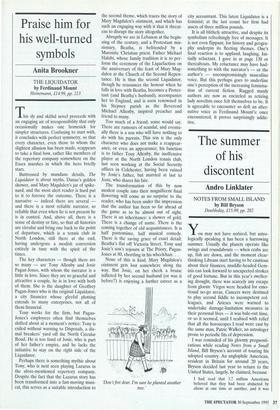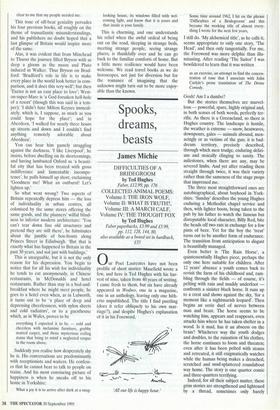The summer of his discontent
Andro Linklater
NOTES FROM SMALL ISLAND by Bill Bryson Doubleday, f15.99, pp. 282 You may not have noticed, but astro- logically speaking it has been a harrowing summer. Usually the planets operate like swings and roundabouts — when crabs are up, fish are down, and the moment clear- thinking Librans start having to be cautious about their finances, muddle-headed Gem- inis can look forward to unexpected strokes of good fortune. But in this year's swelter- ing drought, there was scarcely any escape from gloom: Virgos were headed for emo- tional no-go areas, Cancers were destined to play second fiddle to incompetent col- leagues, and Arieses were warned to undertake damage-limitation measures in their personal lives — it was bale-out time, or so it seemed, until I realised with relief that all the horoscopes I read were cast by the same man, Patric Walker, an astrologer prone to periodic fits of depression.
I was reminded of his gloomy prognosti- cations while reading Notes from a Small Island, Bill Bryson's account of touring his adopted country. An anglophile American, resident in Britain for around 20 years, Bryson decided last year to return to the United States, largely, he claimed, because I had read ' that 3.7 million Americans believed that they had been abducted by aliens at one time or another, and it was
clear to me that my people needed me.
This tone of off-beat geniality pervades his four previous books, all roughly on the theme of transatlantic misunderstandings, and his publishers no doubt hoped that a last glimpse of Britain would inspire more of the same.
Alas, it was evident that from Minehead to Thurso the journey filled Bryson with as deep a gloom as the moon and Pluto induced in Walker. Thus Bryson on Brad- ford: 'Bradford's role in life is to make every place in the world look better in com- parison, and it does this very well'; but then `Exeter is not an easy place to love'; West- on-super-Mare is 'a God-forsaken hell-hole of a resort' (though this was said in a tem- per); 'I didn't hate Milton Keynes immedi- ately, which is, I suppose, as much as you could hope for the place'; and in Aberdeen, 'I walked for nearly three hours up streets and down and I couldn't find anything remotely adorable about Aberdeen'.
You can hear him gamely struggling against the darkness. 'I like Liverpool', he insists, before dwelling on its shortcomings, and having lambasted Oxford as 'a beauti- ful city that has been treated with gross indifference and lamentable incompe- tence', he pulls himself up short, exclaiming `Goodness me! What an outburst! Let's lighten up.'
So what went wrong? Two aspects of Britain repeatedly depress him — the loss of individuality in urban centres, all colonised by the same stores offering the same goods, and the planners' wilful blind- ness to inferior modern architecture: 'You can't tear down fine old structures and pretend they are still there', he fulminates about the jumble of box-fronts along Princes Street in Edinburgh. 'But that is exactly what has happened to Britain in the past 30 years, and not just with buildings.'
This is unarguable, but it is not the only reason for his depression. You begin to notice that for all his wish for individuality he tends to eat anonymously, in Chinese restaurants, in McDonalds and hotel restaurants. Rather than stay in a bed-and- breakfast where he might meet people, he goes to a hotel even when, as in Lulworth, it turns out to be 'a place of deep and depressing cheerlessness, with nylon sheets and cold radiators', or to a guesthouse which, as in Wales, proves to be everything I expected it to be — cold and cheerless with melamine furniture, grubby matted carpet, and those mysterious ceiling stains that bring to mind a neglected corpse in the room above.
Suddenly you realise how desperately shy he is. His conversations are predominantly with receptionists and waiters. He confess- es that he cannot bear to talk to people on trains. And his most convincing picture of happiness is when he sneaks off to his home in Yorkshire: What a joy it is to arrive after dark at a snug-
looking house, its windows filled with wel- coming light, and know that it is yours and that inside is your family.
This is charming, and one understands his relief when the awful ordeal of being out on the road, sleeping in strange beds, meeting strange people, seeing strange places, is thankfully over and he can go back to the familiar comforts of home. But a little more resilience would have been welcome. We read travel books as we do horoscopes, not just for diversion but for the romance of imagining that the unknown might turn out to be more enjoy- able than the known.



































































 Previous page
Previous page